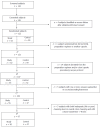Multicenter, randomized study to optimize bowel preparation for colon capsule endoscopy
- PMID: 29358870
- PMCID: PMC5752722
- DOI: 10.3748/wjg.v23.i48.8615
Multicenter, randomized study to optimize bowel preparation for colon capsule endoscopy
Abstract
Aim: To assess the cleansing efficacy and safety of a new Colon capsule endoscopy (CCE) bowel preparation regimen.
Methods: This was a multicenter, prospective, randomized, controlled study comparing two CCE regimens. Subjects were asymptomatic and average risk for colorectal cancer. The second generation CCE system (PillCam® COLON 2; Medtronic, Yoqneam, Israel) was utilized. Preparation regimens differed in the 1st and 2nd boosts with the Study regimen using oral sulfate solution (89 mL) with diatrizoate meglumine and diatrizoate sodium solution ("diatrizoate solution") (boost 1 = 60 mL, boost 2 = 30 mL) and the Control regimen oral sulfate solution (89 mL) alone. The primary outcome was overall and segmental colon cleansing. Secondary outcomes included safety, polyp detection, colonic transit, CCE completion and capsule excretion ≤ 12 h.
Results: Both regimens had similar cleansing efficacy for the whole colon (Adequate: Study = 75.9%, Control = 77.3%; P = 0.88) and individual segments. In the Study group, CCE completion was superior (Study = 90.9%, Control = 76.9%; P = 0.048) and colonic transit was more often < 40 min (Study = 21.8%, Control = 4%; P = 0.0073). More Study regimen subjects experienced adverse events (Study = 19.4%, Control = 3.4%; P = 0.0061), and this difference did not appear related to diatrizoate solution. Adverse events were primarily gastrointestinal in nature and no serious adverse events related either to the bowel preparation regimen or the capsule were observed. There was a trend toward higher polyp detection with the Study regimen, but this did not achieve statistical significance for any size category. Mean transit time through the entire gastrointestinal tract, from ingestion to excretion, was shorter with the Study regimen while mean colonic transit times were similar for both study groups.
Conclusion: A CCE bowel preparation regimen using oral sulfate solution and diatrizoate solution as a boost agent is effective, safe, and achieved superior CCE completion.
Keywords: Bowel preparation; Capsule colonoscopy; Capsule endoscopy; Endoscopy; Large intestine; Purgative.
Figures

References
-
- Rex DK, Adler SN, Aisenberg J, Burch WC Jr, Carretero C, Chowers Y, Fein SA, Fern SE, Fernandez-Urien Sainz I, Fich A, Gal E, Horlander JC Sr, Isaacs KL, Kariv R, Lahat A, Leung WK, Malik PR, Morgan D, Papageorgiou N, Romeo DP, Shah SS, Waterman M. Accuracy of capsule colonoscopy in detecting colorectal polyps in a screening population. Gastroenterology. 2015;148:948–957.e2. doi: 10.1053/j.gastro.2015.01.025. - DOI - PubMed
-
- Eliakim R, Yassin K, Niv Y, Metzger Y, Lachter J, Gal E, Sapoznikov B, Konikoff F, Leichtmann G, Fireman Z, et al. Prospective multicenter performance evaluation of the second-generation colon capsule compared with colonoscopy. Endoscopy. 2009;41:1026–1031. doi: 10.1055/s-0029-1215360. - DOI - PubMed
-
- Eliakim R, Fireman Z, Gralnek IM, Yassin K, Waterman M, Kopelman Y, Lachter J, Koslowsky B, Adler SN. Evaluation of the PillCam Colon capsule in the detection of colonic pathology: results of the first multicenter, prospective, comparative study. Endoscopy. 2006;38:963–970. doi: 10.1055/s-2006-944832. - DOI - PubMed
Publication types
MeSH terms
Substances
LinkOut - more resources
Full Text Sources
Other Literature Sources
Medical

